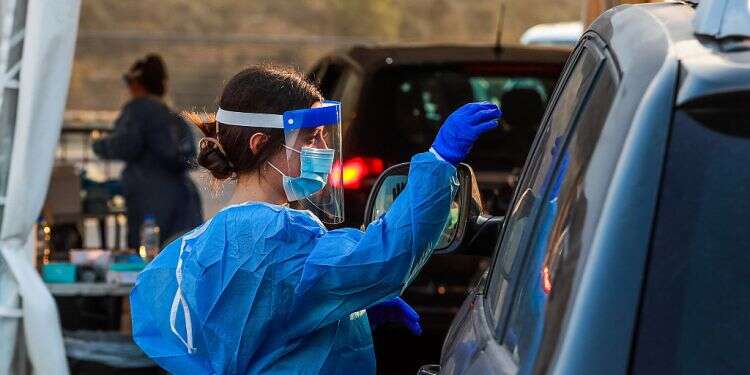Israel recorded the highest number of daily coronavirus infections since early September on Wednesday. According to Health Ministry data, 11,978 of the 201,378 Israelis who tested for COVID were found to have the disease for an infection rate of 6.65%.
Follow Israel Hayom on Facebook, Twitter, and Instagram
There are 57,858 active cases of the virus. There are 125 people in serious condition, 38 of whom are on ventilators. Around 75% of those in serious condition are unvaccinated.
The reproduction rate continues to rise and now stands at 1.94.
According to ministry data, the daily average of coronavirus cases last week was 3,843. That number has since tripled to 9,833.
Since the outbreak of the pandemic, 8,247 have died from COVID-19.
A fourth dose of the coronavirus vaccine boosts antibodies fivefold a week after the shot is administered, Prime Minister Naftali Bennett said on Tuesday, citing preliminary findings of a research trial underway at Sheba Medical Center at Tel Hashomer.
"This most likely means a significant increase [in protection] against infection and ... hospitalization and [severe] symptoms," Bennett said.
"A week into the fourth dose, we know to a higher degree of certainty that the fourth dose is safe," Bennett said at Sheba Medical Center, which is giving second booster shots in a trial among its staff amid a nationwide surge in Omicron variant infections.
With Israelis overwhelming COVID testing stations across the country amid the current Omicron wave, government officials on Wednesday convened to discuss new guidelines for who is eligible for PCR testing.
Health Minister Nitzan Horowitz kicked off a press morning on the proposed changes Wednesday morning by saying, "The number of confirmed cases is rising as we expected. We were prepared for this. We are also prepared for higher infection rates.
"The policy we have implemented is proving itself. We are adjusting the steps to the new situation, while continuing to live alongside the coronavirus through maintaining our routine lives."
He continued: "The Omicron wave requires a certain paradigm shift. We adjusted the quarantine guidelines, and we will also adjust the testing guidelines: PCR tests for those over 60, high-risk groups, and the unvaccinated. The vaccinated will not take at-home tests and will not need to be tested at testing stations."
Explaining the rationale for the move, Horowitz said, "This will keep people from having to wait in line and provide a solution" to the heavy traffic we are seeing at testing stations, he said.
"We are ensuring there is a large stock of additional antigen tests, vaccine tests, there is enough medicine and tests. We will provide all of the tools [necessary] for public health," assured Horowitz.
Purchases of at-home antigen tests have increased 700% in recent days leading many pharmacies to run out of stock.
According to the CEO of pharmacy chain Be by Supershal Ori Watermann, the spread of the Omicron variant has led to a global shortage in at-home antigen tests as the world shifts from more expensive PCR testing that must be carried out in a lab.
Meanwhile, Haim Bibas, the mayor of the central Israel city of Modiin and chairman of the Federation of Local Authorities in Israel has asked Bennett and Health Minister Nitzan Horowitz to come up with a new model that would instead rank cities according to how many residents are vaccinated and recovered.
The traffic-light program "does not constitute another significant factor in stopping infection," Bibas said. He, along with many other local authority heads, have called for the government to task them with managing the fight against infections, arguing they are better equipped for the effort.
Ninety-one cities are now designated "red" according to the government's traffic-light program for designating local authorities according to infection levels
"We call on the government not to dawdle and to act urgently to convene a meeting that will adopt the new framework so that we can make decisions according to relevant data and up-to-date frameworks. It is only in this manner that we will be able to restore routine and sanity to residents," Bibas wrote in his letter, which was also addressed to Interior Minister Ayelet Shaked, Public Security Minister Omer Bar-Lev, Education Minister Yifat Shasha-Biton.
"We must all enlist to achieve this goal and coordinate the efforts of central and local governments to achieve it," he argued.
Senior local authority officials said the proposed framework would allow for the lifting of restrictions when possible and greater control over efforts to rein in the virus.
Subscribe to Israel Hayom's daily newsletter and never miss our top stories!




